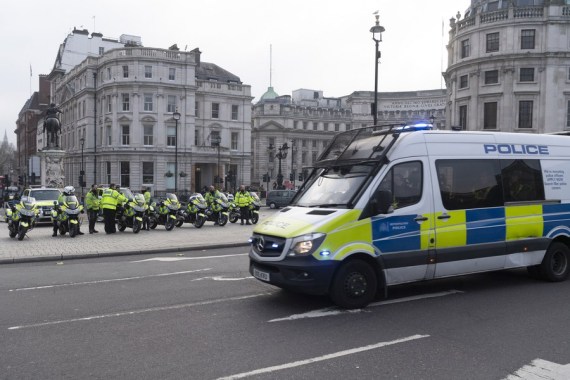20 UK police injured during protests over controversial bill, lockdown
Published : 22 Mar 2021, 23:04
Fueled by growing anger over a controversial new crime bill and COVID-19 lockdown measures, thousands of Britons took to the street over the weekend, leaving around 20 police officers injured and dozens of protesters arrested across Britain, reported Xinhua.
In Bristol, around 3,000 people gathered to protest over the Police, Crime, Sentencing and Courts Bill, which gives police greater powers to control static protests. The demonstration had led to a riot involving up to 500 protesters.
Around 300 police officers were deployed to contain the riot, during which a police station was attacked and 20 cops were injured. Among the injured officers, two were taken to hospital after suffering broken bones. One of them also suffered a punctured lung.
British Home Secretary Priti Patel has condemned the riot in Bristol as "thuggery and disorder by a minority."
Nick Thomas-Symonds, Labour shadow home secretary, said the scenes seen in Bristol were "completely unacceptable and inexcusable."
Andy Marsh, chief constable of Avon and Somerset Police, said Monday the wanton violence and destruction "had nothing to do with protest -- it was committed by those looking for an excuse to commit disorder."
Currently being debated in the British Parliament and expected to be agreed by lawmakers later this week, the bill would include the ability to impose start and finish times and enforce maximum noise limits, among others.
The British Home Office, responsible for interior issues, said the new bill is needed because the Public Order Act 1986 is no longer fit for managing the types of protests now being experienced.
Critics of the bill fear it would give police sweeping powers to shut down any protest.
During the weekend, demonstrations also took place in other cities across Britain against lockdown measures as the number of COVID-19 death falls.
In Manchester, hundreds of people gathered outside the city's National Football Museum before marching to police headquarters, claiming the COVID-19 lockdown is a crime.
Demonstrators also gathered in the center of Edinburgh, the capital city of Scotland, to show their opposition to restrictive measures imposed to control the spread of the virus.
At least 36 people were arrested as thousands of people marched through central London under a heavy police presence to protest against lockdown measures.
The Metropolitan Police said 36 people had been arrested by 6:45 p.m. (1845 GMT) on Saturday, many for breaching COVID-19 regulations.
Thousands of people joined Saturday's demonstration, which traveled from Hyde Park to St Paul's Cathedral and back to Westminster ahead of the anniversary of Britain's first lockdown, which began on March 23 last year.
These protests took place even though large gatherings are prohibited under government-imposed anti-virus measures.
"We once again saw police come under fire from missiles thrown by people in crowds, and several were injured as a result of targeted assaults. It is totally unacceptable and saddening that officers enforcing regulations that are there to protect us all were the victims of violent attacks," said Laurence Taylor, deputy assistant commissioner at the Metropolitan Police.
Taylor said officers sought to engage with people who had gathered to explain that their actions were unlawful under the COVID-19 regulations, and encouraged them to go home to help protect themselves and others during this public health crisis.
On Feb. 22, British Prime Minister Boris Johnson announced his long-anticipated "roadmap" exiting the lockdown. The March 8 reopening of schools was the first part of the four-step plan, which is expected to see all legal restrictions in England being removed by mid-June.
Other parts of Britain, including Wales and Northern Ireland, have also unveiled plans to ease the restrictions.
Experts have warned Britain is "still not out of the woods" amid concerns over new variants and the risks of the public breaching restriction rules.
To bring life back to normal, countries such as Britain, China, Germany, Russia and the United States have been racing against time to roll out coronavirus vaccines.


